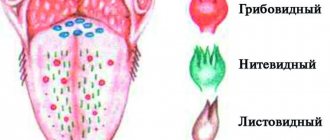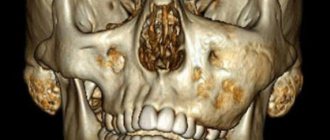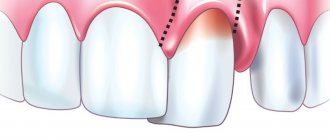What is dysgeusia and what causes its occurrence?
Dysgeusia (distortion of taste) is a disease in which the sense of taste is partially or completely absent. There are many reasons for this disease. Using the sense of taste, we can determine the taste of food and other elements entering the body. The sense organs that are responsible for this function are called taste buds.
They are located on the surface of the tongue. Under some conditions, a person may lose the ability to taste foods. Experts distinguish four main types of such disorders, namely pargeusia, dysgeusia, ageusia or hypogeusia. The complete absence of all taste sensations is called ageusia, partial weakening is called hypogeusia . Sometimes, a person constantly feels an unpleasant taste, regardless of the product he consumes. Distorted taste, which has a metallic taste, is a sign of dysgeusia.
Taste qualities with dysgeusia are distorted
Based on the above, taste qualities in dysgeusia are not completely absent, but are distorted. Some experts call dysgeusia (taste distortion) any taste disorder, while others use this term to mean a certain type of taste disorder. That is, dysgeusia is any change in taste, including a strange taste. No one is immune from the occurrence of taste deviations. They can occur at any age. People with dysgeusia constantly experience an unpleasant, salty, rancid or metallic taste in their mouth.
Even ice cream can have a salty or metallic taste. There are cases when people also experience changes in smell. Taste buds and receptors responsible for smell are interconnected, so this phenomenon is quite common.
One of the most common symptoms of dysgeusia is the presence of a metallic taste in the mouth.
Diagnosis of taste disorders in children
If you suspect a taste disorder, you should contact a specialist. Parents should be alerted by the refusal of familiar and favorite foods, and at a more conscious age, by the child’s complaints. Also, the baby may begin to eat things that are not intended for this (it should be noted that at a certain age children “put everything in their mouths” in order to explore the world around them, and this is absolutely normal).
Diagnosing taste disorders in preschool children is quite difficult, since children cannot always clearly describe their sensations. During the examination, the corresponding side of the tongue is moistened alternately with a sweet, sour and bitter solution using pipettes. After each session, rinse your mouth thoroughly. In infants, the doctor pays attention to the general motor and facial reaction. Children over two years old can most often consciously talk about their feelings. Source: E.V. Pavlovskaya Selective appetite in children // Issues of modern pediatrics / 2013/ Volume 12/ No. 6
Is taste distortion always associated with dysgeusia?
Distortion of taste can signal not only dysgeusia, but also other diseases. Often, after the disease is completely cured, the disturbance in taste disappears and everything returns to normal. If the symptom remains, the possibility of a chronic taste disorder should be considered.
Distortion of taste sensations occurs as a result of disruptions in the functioning of the receptors responsible for taste. Research has shown that dysgeusia may be caused by a decrease in the number of microvilli in taste receptor cells. It should be noted that with a decrease in the nucleus and cytoplasm of receptor cells, similar deviations occur.
Another important reason for the development of dysgeusia is the use of certain medications. These include certain diuretics, tetracycline, metronidazole, penicillamine, as well as anigestamines of the H1 series. Each drug has a different effect on taste receptors. However, the result is the same - a change and disturbance in taste.
Children's and adult ENT doctor, audiologist, otoneurologist, candidate of medical sciences, Budanov E.G.
Regularly, patients who come for an ENT appointment experience a decrease, disappearance, or distortion of taste sensations, or the appearance of a foreign taste in the mouth. Often these sensations are protracted and lead to changes in taste habits, repeated attempts to self-medicate (gargling, washing the tonsils, constant cleaning of the tongue, etc.) and repeated visits to various specialists: dentists, gastroenterologists, therapists, etc. . Many such visits end with old recommendations being crossed out due to their ineffectiveness and new appointments, which in turn also lead to nothing. To effectively assess and treat taste disturbances, it is necessary to understand the causes of their occurrence. In our body, receptors located in the oral cavity, mainly on the tongue in special taste buds, are responsible for taste sensations. These receptors have different sensitivity to taste stimuli. Some react predominantly to sour, bitter or, say, salty, while others react exclusively to sweet. There are also receptors that respond to a very specific “umami” taste, somewhat similar to the taste of meat dishes. There are also such tastes as burning, or metallic taste, tart taste, etc. Such sensations are not independent individual tastes, but only a generalization of the combination of “standard” tastes with tactile and other sensations on the tongue. Distortion or loss of the ability to distinguish tastes and tastes disrupts the quality of life, the pleasure of eating, appetite, physiological processes of digestion, can cause psychological problems, leads to neuroses and other anxiety states. There is a complete disturbance in the perception of taste, its reduction or distortion. Closely related to a violation of the sense of taste is a violation of the sense of smell, since this leads to a decrease in the “brightness” of the perception of taste and its integral emotional assessment by our consciousness. Often, a decrease in taste perception in such cases is associated with the patient having a runny nose (infections, allergies, occupational hazards, inflammation of the sinuses, etc.) In most cases, such disorders are temporary and disappear as the inflammatory changes in the oral and nasal cavity subside . In such situations, taste disturbance can also be facilitated by the use of medications to treat these diseases: local and general antibiotics, nasal and oral sprays, etc. Persistent loss of taste for more than several weeks - ageusia - can be a sign of a serious illness, so in such cases it is recommended to consult a doctor. This may be due to:
- Metabolic organ dysfunction (hypothyroidism, diabetes mellitus, Cushing's syndrome, etc.)
- Head injuries, including damage to the middle part of the brain (thalamus)
- Brain tumors
- Neoplasms of the oral cavity and tongue
- Chronic dental infections, stomatitis, glossitis
- Sub- and atrophic pharyngitis
- Diseases of the glossopharyngeal and facial nerve
- Upper respiratory tract infections
If, on the contrary, some foreign taste is mixed in when eating food, or all food has a similar “wrong” taste, this may be a signal of serious health problems. For example, a persistent sweetish taste even in unsweetened foods, meat dishes, vegetables, spices, etc. can talk about:
- Possible disruption of insulin metabolism (pre-diabetic or even diabetic stage).
- Acute and chronic intoxication with industrial or household poisons, pesticides, heavy metals, etc.
- Viral infections that damage the taste buds of the tongue, nerves, or the brain's taste processing centers, including coronavirus infection, which is widespread today.
- Psycho-emotional states and mental illnesses (neuroses, stress conditions, depression)
- Infections of the nasal cavity, sinuses, nasopharynx and oral cavity, as well as the lower respiratory tract, caused by Pseudomonas aeruginosa, the waste products of which have a specific unpleasant odor and sweet taste.
- Oncological diseases of the chest organs, primarily lung cancer, as well as larynx and lower parts of the pharynx.
A predominantly sour taste in the mouth can also be associated with viral infections, poisoning, the presence of bacterial infections in the oral cavity (stomatitis, gingivitis, periodontitis) or respiratory tract, as well as:
- In patients with diseases of the esophagus and stomach (diverticula, Barrett's esophagus, esophagitis, gastritis, peptic ulcer of the stomach and esophagus and others), accompanied by reflux of gastric juice through the esophagus into the pharynx.
- In the presence of an infection associated with reflux caused by the microorganism Helicobacter pylori
A salty or clearly salty taste may indicate problems with oral hygiene; it is also observed when drinking alcohol or insufficient fluid intake into the body. Such changes in taste sensations can be easily eliminated if, say, you carry out high-quality oral care, brush your teeth at least 2 times a day, consult a dentist in a timely manner, limit alcohol intake, regulate the daily amount of fluid you drink, etc. The persistence of a salty taste in the mouth while following the above measures may indicate the possible presence of such serious conditions as:
- Inflammation of the salivary glands caused by bacterial infections of the oral cavity and upper respiratory tract, most often streptococci and staphylococci.
- Inflammatory diseases of the sinuses (rhinosinusitis), adenoids in children, etc., which are also associated with bacterial (primarily pneumococci) and, less commonly, fungal infections. The waste products of these microorganisms have a salty taste and impart a similar taste to saliva and mucus that accumulates in the mouth, tongue and pharynx.
Bitterness in the mouth is often associated with taking various medications (antibiotics, choleretic, psychotropic drugs, metronidazole, etc.), physical activity, leading to increased pressure on the abdominal muscles and diaphragm. In serious cases, a bitter taste in the mouth may indicate the presence of:
- Diseases of the gastrointestinal tract, including diseases of the liver, gall bladder and biliary tract, impaired intestinal motility, etc.
- Diseases of the central nervous system, including various types of epilepsy, multiple sclerosis, etc.
- Observed in postmenopausal women
A number of patients experience unusual taste sensations when they eat foods that are familiar to them. For example, vegetables acquire a meaty or fishy taste, fruits acquire a smoked or onion taste, and meat dishes acquire a rotten taste of hydrogen sulfide. There is often a complaint of a metallic taste, a taste of acetone. Similar distortions - dysgeusia (or parageusia) are often found nowadays with coronavirus infection and other viral diseases, and can also be observed with:
- Diseases of the thyroid gland, primarily hypothyroidism with or without autoimmune thyroiditis
- Diseases of the hematopoietic system - iron deficiency, B-12 deficiency anemia.
- Diseases of the gastrointestinal tract, in which the absorption of various microelements and vitamins is impaired.
- Pregnancy
- Mental illness or taking psychotropic drugs
- Poisoning with salts of heavy metals (mercury, lead), arsenic, etc.
In all such cases, competent treatment and prevention of complaints of impaired taste sensations can be prescribed only after a comprehensive assessment of the patient’s health as a whole, and his individual systems in each specific case. For this purpose, the friendly work of doctors of various specialties is required: dentist, ENT doctor, otoneurologist, gastroenterologist, neurologist, psychiatrist, hematologist, endocrinologist, laboratory diagnostic doctors, endoscopists, etc. Self-medication or delay in treatment can lead to serious health consequences, persistent disturbance of taste sensations and complications from those body systems whose functioning has affected the distortion or loss of taste perception.









